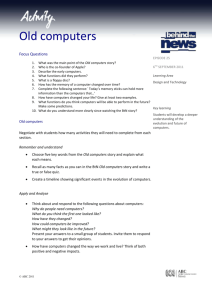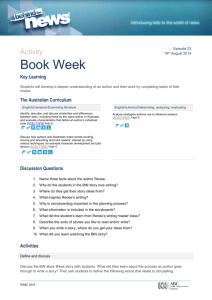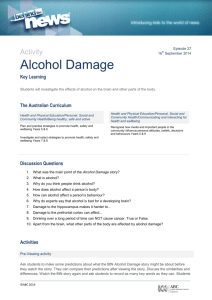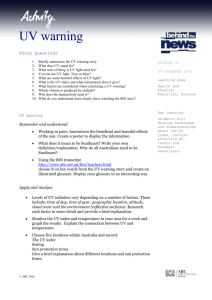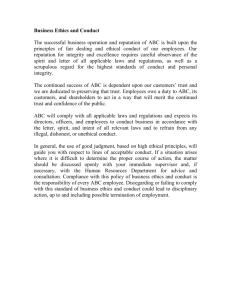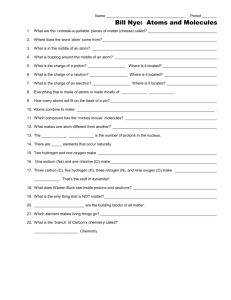Science Kids
advertisement
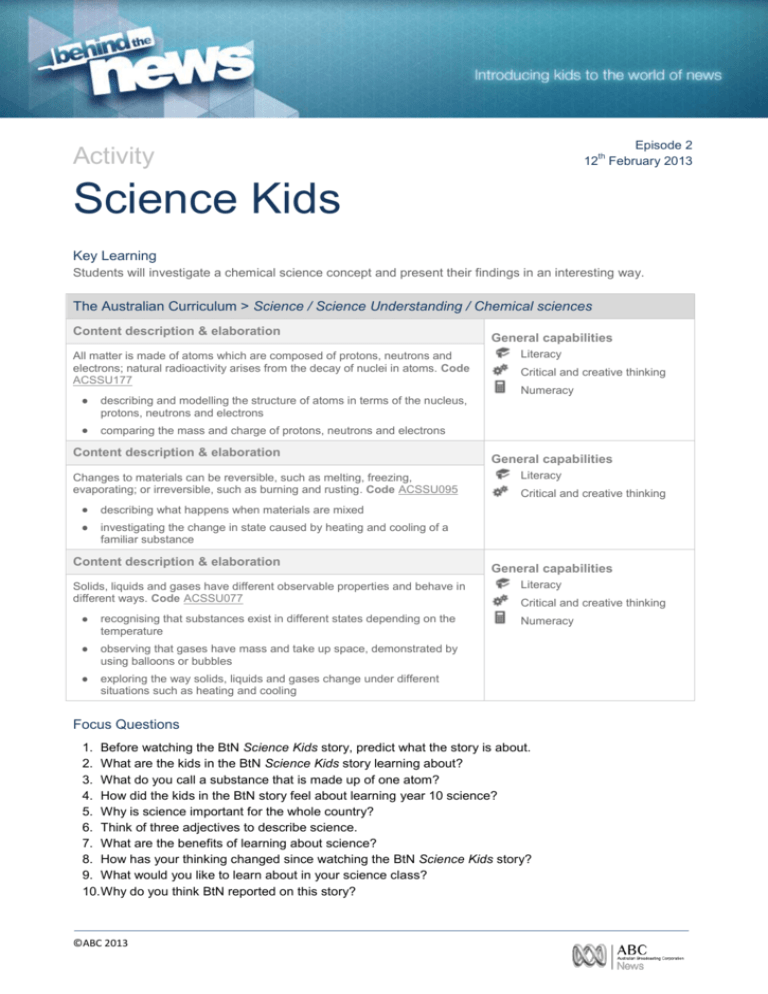
Episode 2 th 12 February 2013 Activity Science Kids Key Learning Students will investigate a chemical science concept and present their findings in an interesting way. The Australian Curriculum > Science / Science Understanding / Chemical sciences Content description & elaboration All matter is made of atoms which are composed of protons, neutrons and electrons; natural radioactivity arises from the decay of nuclei in atoms. Code ACSSU177 General capabilities Literacy Critical and creative thinking Numeracy describing and modelling the structure of atoms in terms of the nucleus, protons, neutrons and electrons comparing the mass and charge of protons, neutrons and electrons Content description & elaboration Changes to materials can be reversible, such as melting, freezing, evaporating; or irreversible, such as burning and rusting. Code ACSSU095 General capabilities Literacy Critical and creative thinking describing what happens when materials are mixed investigating the change in state caused by heating and cooling of a familiar substance Content description & elaboration Solids, liquids and gases have different observable properties and behave in different ways. Code ACSSU077 recognising that substances exist in different states depending on the temperature General capabilities Literacy Critical and creative thinking Numeracy observing that gases have mass and take up space, demonstrated by using balloons or bubbles exploring the way solids, liquids and gases change under different situations such as heating and cooling Focus Questions 1. Before watching the BtN Science Kids story, predict what the story is about. 2. What are the kids in the BtN Science Kids story learning about? 3. What do you call a substance that is made up of one atom? 4. How did the kids in the BtN story feel about learning year 10 science? 5. Why is science important for the whole country? 6. Think of three adjectives to describe science. 7. What are the benefits of learning about science? 8. How has your thinking changed since watching the BtN Science Kids story? 9. What would you like to learn about in your science class? 10. Why do you think BtN reported on this story? ©ABC 2013 Activity Encourage students to explore the fundamental concepts of how the universe is made up and learn about contemporary science in interesting ways. Remembering – Questions & Answers Facilitate a questions and answers discussion to encourage students to engage with science. Here are some questions starters: What words do you associate with science? Hold a class brainstorming session. What is science? Come up with a class definition of science. Think of how your life would be different without scientific discoveries. Do you know that the world we live in is made up of atoms? Consider how science plays a part in your everyday life. Understanding – What does an atom look like? What in the world is an atom? Or, more appropriately, what in the world isn’t an atom! Air, water, people, robots — everything is made of atoms! – Brain POP http://www.brainpop.com/science/matterandchemistry/atoms/preview.weml Ask students to find out more about atoms by conducting research using the internet, newspapers and other sources of information. Here are some inquiry questions. What is an atom? How do scientists weigh them, measure them and tell them apart? How are the elements ordered by weight? What is the structure of an atom? Describe the parts of an atom and then draw and model a 3D structure of an atom to help with your description. Allow students to improvise by providing them with straws and plasticine to model their atoms. Applying – the periodic table of elements Demonstrate your understanding and ability to use the periodic table of elements. What do the colours, numbers, arrows, symbols and names represent? Ask your students to conduct research on one element from the periodic table (concentrate on the first 20 elements). Students can present their findings both in a report and pictorially. Combine the students finished posters to make up the periodic table and display in the classroom. Here are some examples taken from http://www.periodictableforkids.com: ©ABC 2013 Chemistry Quiz – Is your chemistry knowledge as light as helium or heavy as plutonium? Here is a chemistry quiz to test your knowledge http://www.abc.net.au/science/games/quizzes/2010/chemistry/ Analysing – Experimenting in the classroom Conduct a chemical experiment in the classroom. Follow one of CSIRO’s Science by Email experiments. CSIRO’s Science by Email is a free online newsletter for students, teachers and anyone with an interest in science. Take a look at the following experiments that focus on atoms and molecules. How to make sherbet – http://www.csiro.au/helix/sciencemail/activities/Sherbet.html Bendy water – http://www.csiro.au/helix/sciencemail/activities/WaterBend.html Glow worm – http://www.csiro.au/helix/sciencemail/activities/glowworm.html Charge your light bulbs – http://www.csiro.au/helix/sciencemail/activities/ChargeYourLightbulbs.html Static electricity – http://www.csiro.au/Portals/Education/Programs/Do-it-yourself-science/Physicalsciences-activities/static-electricity-activity.aspx Consider inviting a local scientist to your classroom to hold a Q&A discussion which will form part of your research on a science topic you are currently studying. Alternatively go to the ABC Science Ask an Expert website to ask a curly question! http://www.abc.net.au/science/askanexpert/ Evaluating & Creating Create your own mini science lesson to teach to students in another class. The ABC’s Surfing Scientist has lots of lessons to inspire you http://www.abc.net.au/science/surfingscientist/lessonplans/default.htm . Carefully plan your lesson so that you are clear about what you want students to learn. Share your lesson with a group of students in your class or another class. Further Investigation Teachers, are you looking to excite your students about science? Then enter the Sleek Geeks Eureka Prize. Download the teacher notes and lesson plans. http://eureka.australianmuseum.net.au/teacher Related Research Links ABC 7.30 – Weird Science reveals more advanced students http://www.abc.net.au/7.30/content/2012/s3647537.htm ABC Science – The Surfing Scientist http://www.abc.net.au/science/surfingscientist/lessonplans/default.htm Australian Museum – Eureka Prizes: Teacher Resources http://eureka.australianmuseum.net.au/teacher CSIRO – Education http://www.csiro.au/en/Portals/Education.aspx Behind the News – Higgs Boson http://www.abc.net.au/btn/story/s3549384.htm Behind the News – Fun Science http://www.abc.net.au/btn/story/s3318419.htm ©ABC 2013

